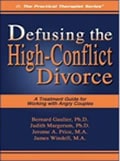
In the real world, children do sometimes live alone with parents who are mentally ill. However, even parents with significant mental health problems are important to their children. If a mentally ill parent takes recommended medication and is in therapy, she may function quite well as a parent. Sometimes it even happens that the mental illness is contained well enough that it doesn’t have much impact on the family or child.
Often, children have been living with both parents until the time of the divorce. The mentally ill parent may have cared for the children, tended to their needs, and participated in family life.
The parent who accuses her co-parent of being mentally ill as part of the post-divorce conflict may forget or just ignore the fact that the other parent behaved as a fully functioning parent for years.
The children may have been left alone with the parent for hours or days without question until the divorce occurs. The accusing parent may justify her new concern based on having been there to supervise the situation in the past and feeling she now has no control if the children are not with her.
*****
Crystal was a stay-at-home mom who knew her husband, Cassidy, was not stable. After a divorce, Crystal wanted to balance their children’s need for a father with her concerns about his mental health and erratic behavior. Prior to the divorce, Crystal could supervise and control the extent to which the children were with their father. After the divorce, she could no longer do this.
“I was afraid for the safety of our children,” Crystal said,
“because I couldn’t trust Cassidy’s judgment. He always thought he was fine and in control, but I knew he wasn’t.”
Crystal was not able to persuade the court to order supervised visits, but she was able to limit Cassidy’s parenting time.
*****
Mental illness is certainly a factor in determining what type and amount of parenting time a parent will have. It’s important to look at whether the mental health problem creates any danger for the child, whether the parent is able to care for the child adequately, and whether the parent has the ability to maintain or establish emotional ties with the child.
*****
Denise was a full-time mother, while Alejandro worked long hours.
Denise had always been moody, forgetful, and disorganized, but she was also very close to her children. She had seen a psychiatrist and for periods of time took antidepressant medication as well as medication for attention deficit hyperactivity disorder. With the divorce, initiated by Alejandro, Denise had more frequent mood swings, became much more disorganized, and threatened suicide. The court ordered supervised parenting time for Denise until her moods and depression were stabilized.
 From Defusing the High-Conflict Divorce © 2007 by Bernard Gaulier, Judith Margerum, Jerome A. Price and James Windell. Reproduced for DivorceMagazine.com by permission of Impact Publishers, P.O. Box 6016, Atascadero, CA 93423-6016, U.S.A., Click www.ImpactPublishers.com for more information about this book and its authors. Further reproduction prohibited
From Defusing the High-Conflict Divorce © 2007 by Bernard Gaulier, Judith Margerum, Jerome A. Price and James Windell. Reproduced for DivorceMagazine.com by permission of Impact Publishers, P.O. Box 6016, Atascadero, CA 93423-6016, U.S.A., Click www.ImpactPublishers.com for more information about this book and its authors. Further reproduction prohibited
More Articles from Defusing the High-Conflict Divorce:











Add A Comment